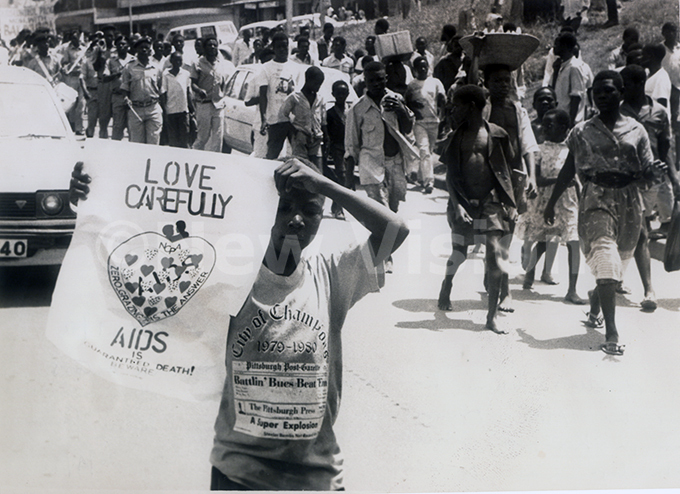Artists fear testing for HIV - Aloysius Matovu
“Some artists have come to me and said they have some form of cancer and because they live in denial, many have since died."
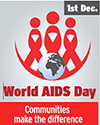
In the build-up to World AIDS Day on December 1, Vision Group is covering the subject of HIV daily. The theme for this year is Communities Make the Difference, in recognition of the essential role that communities play in the AIDS response at the local, national and international levels. One of the Ugandans bolding fighting HIV is Aloysius Joy Matovu who four years ago publicly declared his status to encourage testing.
Local artist and poet Aloysius Matovu Joy in December 2015 declared that he is HIV-positive. He urged fellow artistes to emulate him by testing for the virus. Matovu said he discovered that he was HIV positive when he went to the UK in 2001 and lived there for five years.
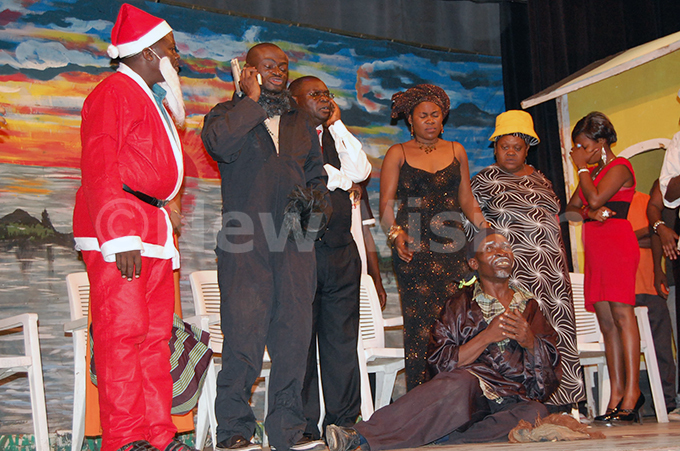 Bakayimbira Dramactors on stage
Bakayimbira Dramactors on stage
Although Matovu had acquired British citizenship, he said upon testing positive, he decided to return to Uganda and join the fight against HIV. "The first thing I did was to test my wife and children. I discovered they were all negative. I told them that they should not worry about me; I would fight the war to the end. I started getting treatment at Mildmay. My CD4 count was 192, but today, it is over 1,000," he said in a moving testimony.
Matovu, who was a guest speaker at a World AIDS Day press conference at the Reproductive Health Uganda (RHU) offices in Kamwokya, Kampala, said many HIV-positive artistes were living in denial. He urged them to test so as to know their status and those found positive to enroll for treatment.
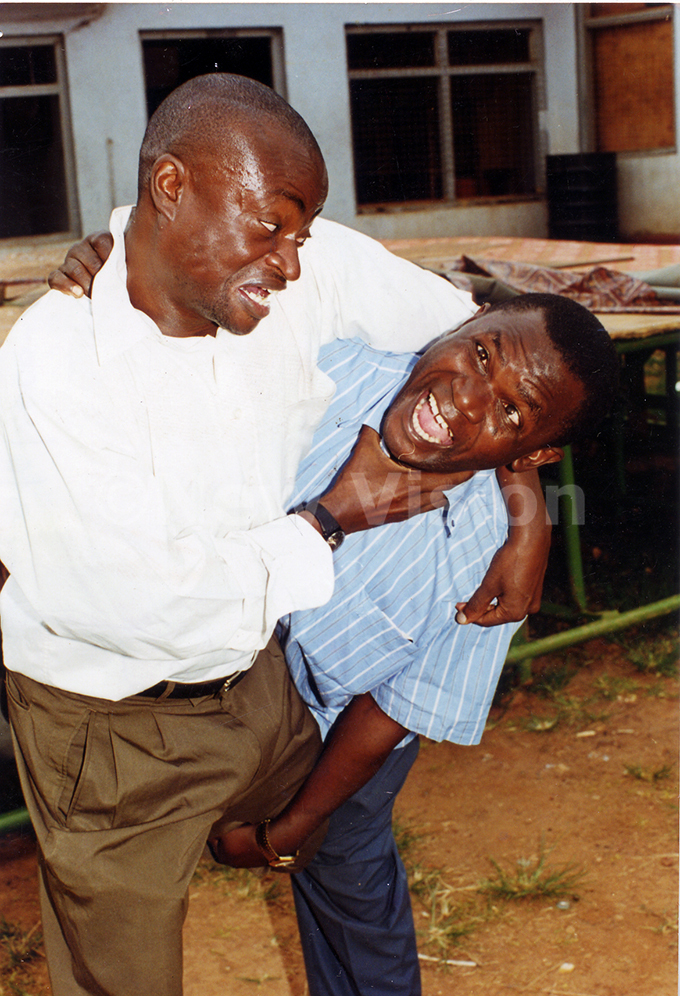 Aloysius Matovu on left acting a scene in a play entitled Akagombe k'enkomerero. Photo by Basudde Elvis
Aloysius Matovu on left acting a scene in a play entitled Akagombe k'enkomerero. Photo by Basudde Elvis
"Some artists have come to me and said they have some form of cancer. But because they lived in denial, many have since died. They do not know that I am now an expert in this field. As a patient, you become an expert before the doctor. With me, it is not whether I am HIV-positive or not. All I want to see is a healthy community, where those with HIV access Anti-Retroviral drugs (ARVs) and live positively," he said. Matovu noted that Mildmay, located in Sseguku along Entebbe Road, welcomes artistes to test with an option to those who want privacy to use the Centre's rear entrance.
"One time, an artist came to Mildmay, but the moment he saw other patients lining up for medication, he fled," Matovu, one of the founding directors of Bakayimbira Dramactors, recounted in a jocular tone.
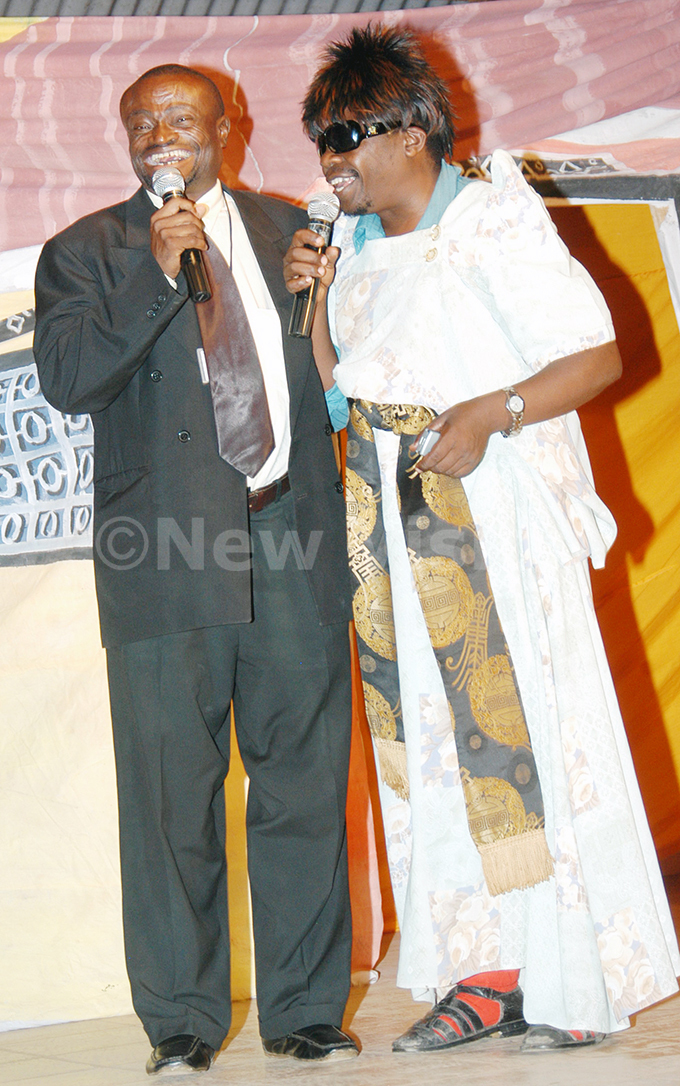 Aloysius Matovu on stage during a scene in a play entitled e mbaga ya Bbumaali at Kasangati at Aug 21, 2010. Photo by Ronnie Kijjambu
Aloysius Matovu on stage during a scene in a play entitled e mbaga ya Bbumaali at Kasangati at Aug 21, 2010. Photo by Ronnie Kijjambu
Margaret Najjingo, a mother of two who is also living positively, said many artistes fear to test because of their fame. The resident of Bwaise in Kawempe division also gave a testimony of how in 1998, her son (now 24 years) showed all signs of an HIV positive person while she was at the same time pregnant. "People used to tell me that once I take my son to the hospital, they will kill her with an injection. But I encouraged myself saying. this is my life and I have to live it. I went to the Joint Clinical Research Centre from where I was referred to Mildmay. I started taking medicine with my son and I delivered an HIV-negative baby girl, now in Senior Two. My son and I are also living positively because we take our drugs regularly. Unfortunately, my husband passed on in 2003," she narrated.
The testimonies took center stage during the briefing where the RHU executive director, Jackson Chekweko, expressed concern that the youth were registering the highest levels of new HIV infections.
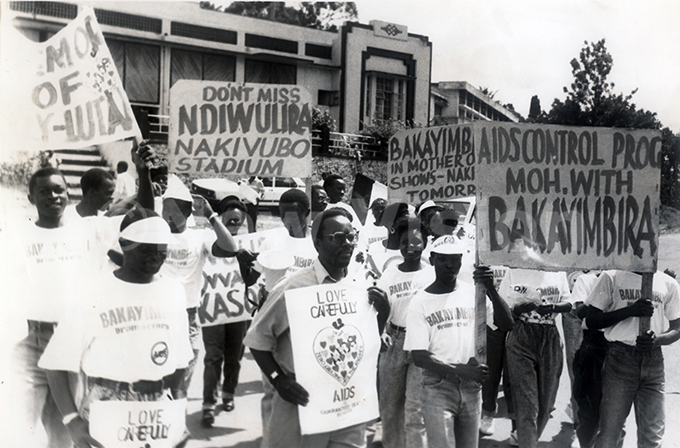 Bakayimbira Dramactors carry out an AIDS Awareness Walk prior to their famous play Ndiwulira at Nakivubo Stadium on April 18, 1992
Bakayimbira Dramactors carry out an AIDS Awareness Walk prior to their famous play Ndiwulira at Nakivubo Stadium on April 18, 1992
Chekweko said the trend was worrying because a nation depends more on the youth for socio-economic development and they must, therefore, be in good health.
"A few years ago, the rates among the marrieds were the highest. But now the trend has changed and it is now higher among the youth. Everyone must play an active role in changing the current trend," observed Chekweko.
To this, Matovu said: "It is natural that the youth start answering to nature by adventuring. So, we need to encourage them to play it safe by using condoms."
Chekweko said despite the high level of new infections, there was no sustainable domestic financing for HIV He urged all stakeholders to join the ‘getting to zero' campaign, which calls for testing, taking ARVs and adherence to the drugs so as to reduce infection rates.
